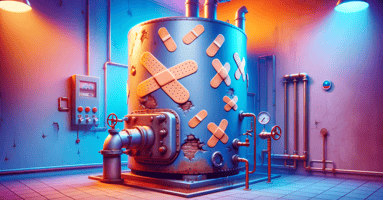There is a hidden problem lurking deep inside your building’s foundation, secretly destroying your...
Maximize Lifespan: How to Avoid Early Boiler Replacement
.png?width=1200&height=626&name=blog%207%20(2).png)
Whether it's providing heat in the winter or ensuring tenants are able to shower in the morning comfortably, boilers are the unsung heroes of your property.
But reality hits hard when they fail unexpectedly. Early boiler replacement can be a financial setback, with costs running into the thousands. It's not just about the boiler replacement cost; it's about the disruption to building operations, the downtime, and the hassle of a major renovation to your property. Instead, let's focus on how you can extend the life of your boilers, ensuring they serve you well for as long as possible.
By adopting proactive measures, you can save on replacing a boiler and ensure it runs efficiently for years. Let's dive into how you can achieve this.
The Spectrum of Boiler Replacement Costs
The average cost of boiler replacement ranges depending on the system you choose. Gas boiler replacements are among the most common, with prices varying based on efficiency levels and the size of your property. For a standard residential property, the gas boiler replacement cost can range from $3,000 to $7,000, including installation.
Oil boilers, known for their efficiency in colder climates, come with different considerations. The oil boiler replacement cost can be slightly higher due to the installation complexities and the need for a storage tank. Property owners expect to pay between $4,000 and $9,000 for a new oil boiler system.
Steam boilers, utilized in older homes and buildings for their robust heating capabilities, present unique challenges in replacement due to the intricacies of steam systems. The steam boiler replacement cost can escalate, ranging from $3,500 to $8,000, factoring in the need for specialized installation expertise.
Understanding the costs of replacing boilers highlights the importance of operating your boiler at peak efficiency.
Regular Maintenance and Inspection
First and foremost, regular maintenance is vital. Think of your boiler like a car; it needs regular check-ups to perform at its best. Setting a maintenance schedule ensures your boiler runs efficiently and any potential issues are caught early. Routine inspections can reveal wear and tear, leaks, or inefficiencies that, if left unchecked, could lead to a breakdown.
Incorporating various sensors into your boiler system can enhance your maintenance strategy. Sensors can monitor for potential issues, providing real-time data that can alert you to problems before they escalate. For instance, a sensor detecting low water levels could indicate a leak in the system. This early detection is crucial, as running a boiler with insufficient water can cause significant damage, potentially leading to a costly replacement.
Sensors can also monitor for other issues, such as high pressure, abnormal temperature fluctuations, and combustion gasses not venting correctly. Each of these conditions can signal different problems within the boiler system. For example, high pressure might suggest a valve failure, while incorrect temperature readings could indicate inefficiency in heat transfer or blockages in the system.
Regular check-ups, supplemented with the advanced monitoring capabilities of sensors, can identify and resolve common issues such as blocked flues, malfunctioning controls, or corroded parts. This not only prevents unexpected failures but also maintains the efficiency of your boiler, helping to keep your energy costs down. Integrating technology into your maintenance routine transforms reactive measures into a proactive maintenance strategy, ensuring your boiler operates safely and efficiently while extending its lifespan.
Understanding and Managing Boiler Load
Boiler load plays a crucial role in the lifespan of your boiler. Boiler load is the demand placed on your boiler to produce heat. High demand or incorrect sizing can lead to stress on the boiler, reducing its lifespan. Managing this load is essential for prolonging its life.
To enhance the efficiency and longevity of your boiler, consider integrating smart boiler controls. These innovative systems go far beyond traditional methods by optimizing when and how your boiler operates, factoring in current indoor temperatures and the day's weather forecast. This intelligent management ensures your boiler runs only when necessary, adapting to real-time conditions and anticipated needs.
Smart boiler controls utilize automation to analyze and respond to various factors, ensuring your boiler's load is precisely managed. These controls can reduce unnecessary strain on your boiler by assessing indoor temperature in real-time and adjusting operations based on the weather forecast. This leads to a more efficient use of energy, as the system avoids heating the property when it's not needed or when outdoor conditions suggest a lesser need for indoor heating.
Water Quality and Treatment
Water quality is another critical factor in boiler health. Poor water quality can lead to scale buildup and corrosion, affecting efficiency and longevity. Implementing a water treatment program is essential to maintain the health of your boiler.
This includes regular testing and treatment of the water to ensure it meets the required standards. Maintaining optimal water conditions can prevent damage to your boiler and ensure it operates efficiently, saving you money in the long run.
Upgrading and Retrofitting
Enhancing your boiler system with modern upgrades is an effective strategy to prolong its service life. Technology advancements offer innovative components that improve efficiency and reduce wear and tear. Among these, smart boiler controls shine for their seamless integration, allowing for improvements without requiring major modifications.
When faced with the choice between upgrading and replacing your boiler, consider the age of your current system alongside the advantages each option presents. Implementing smart controls is particularly beneficial for property managers and owners aiming to maximize the longevity of their boilers without undertaking extensive renovations.
Training and Awareness for Staff
Your staff plays a pivotal role in the effective management of your boiler. Training and awareness are crucial for ensuring your boiler is operated correctly, and any issues are identified quickly.
Incorporating technology can also aid in managing your boiler more effectively. Modern systems can monitor boiler performance and alert staff to any irregularities, helping to prevent issues before they lead to costly repairs or replacement.
Extending the life of your boiler and avoiding early replacement requires a comprehensive approach. From regular maintenance and managing boiler load to water treatment and considering upgrades, each step is crucial in ensuring your boiler serves you efficiently for years. Training your staff and leveraging technology can also play a role in effective boiler management.
By adopting these practices, you save on the average cost of boiler replacement but also ensure your property runs smoothly without the disruption of unexpected boiler failures. Remember, proactive measures are crucial to maximizing your boiler's lifespan. Consider booking a demo to explore how our solutions can help you manage your boiler more effectively, ensuring longevity and efficiency.




